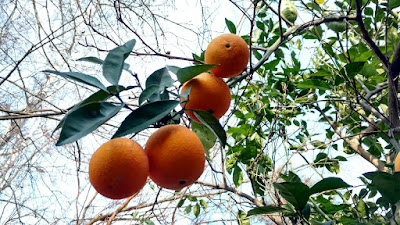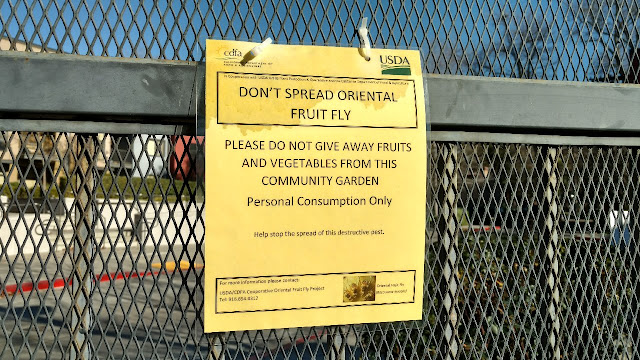This winter, keep your oranges and lemons at home. Don’t give them away or spread them around to family and friends outside Sacramento.
That’s the message from the California Department of Food and Agriculture as well as Sacramento County’s agriculture commissioner.
Because that act of sharing fruit may also be spreading Oriental fruit fly.
Started Aug. 28,
Sacramento County’s quarantine
against this dreaded pest is still in full effect. That means fruit and vegetables grown inside the zone – which includes several Sacramento neighborhoods – cannot be sold outside the quarantine area or given away. The zone covers about 122 square miles in Sacramento and Yolo counties.
More than 125 crops are considered hosts, including grapes, tomatoes, apples, pears, peaches and plums as well as such winter favorites as citrus, pomegranates and persimmons. Plants as well as crops can’t be moved outside the quarantine area, which will remain in effect for at least another six months. (Learn more about the pest and regulations
here
or at
www.cdfa.ca.gov
.)
At Fremont Community Garden in midtown Sacramento, reminders recently went up from the CDFA, which oversees the eradication effort. Home to several citrus trees, the garden has donated in past years fruit to food banks and other charities.
“Don't spread Oriental Fruit Fly,” reads the notices posted on garden gates. “Please do not give away fruits and vegetables from this community garden. Personal consumption only. Help stop the spread of this destructive pest.”
Oriental fruit fly (OFF) is considered among the worst agricultural pests. The first local appearance in a decade, this infestation started in a south Sacramento neighborhood near Stockton Boulevard and Elder Creek Road, east of Highway 99.
About the size of a housefly, the Oriental fruit fly is mostly yellow with black markings and clear wings. It looks similar to a cross between a fly and a wasp.
After the first sightings in August, county and state crews set out hundreds of traps.
“A single male fly was detected in late October outside of the original core area,” said Juli Jensen, Sacramento County’s agricultural commissioner. “It was not close enough in distance or timeline to cause an expansion of the existing quarantine.
“There were a total of 16 OFF trapped in 2018, with 15 being from a core area that caused a 122-square mile quarantine,” she said. “If no further finds, lifecycle projections end the quarantine in early June 2019.”
The OFF quarantine has been most visible at Sacramento’s farmers markets, where sellers have tented their produce with netting to comply with quarantine rules.
“There have not been any changes to the quarantine restrictions,” Jensen said. “In fact, CDFA continues to sign up growers and sellers under OFF compliance agreements. Growers of host commodities within the quarantine area may not sell their product until they have treated it for one lifecycle of the pest under compliance agreement and observation by CDFA. Growers who bring host commodities into the quarantine area may not move the product from its destination (such as a farmers market) unless it has been safeguarded and under compliance agreement.
“We have had to confiscate and destroy fruits and vegetables that were left exposed,” Jensen added. “We have also had to issue fines for such non-compliances.”
Oriental fruit flies don’t like cold, but their larvae can overwinter inside fruit. That’s why it’s so important to keep fruit quarantined.

|
|
Navel oranges are ready to pick now. Keep them at home. (Photo: Debbie Arrington)
|
“OFF thrive best in warmer climates, but larvae are fully expected to be able to survive in fruit during our somewhat mild winters,” Jensen explained. “Adults live approximately 90 days, but would not fare so well in a freeze.”
If someone suspects they’ve seen Oriental fruit flies or fruit fly larvae in fruit, they should call the OFF hotline, 916-654-0312.
Don’t dump citrus in the green waste container either. If fruit falls off trees or needs disposal, it should be double bagged in plastic. For residents inside the quarantine area, call the county agricultural office for pick-up, 916-875-6603.



